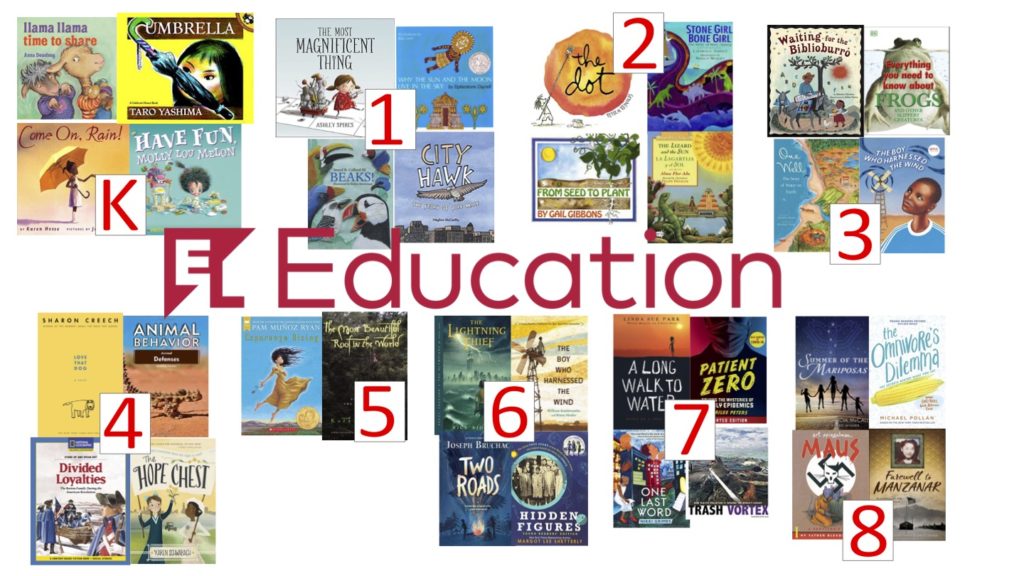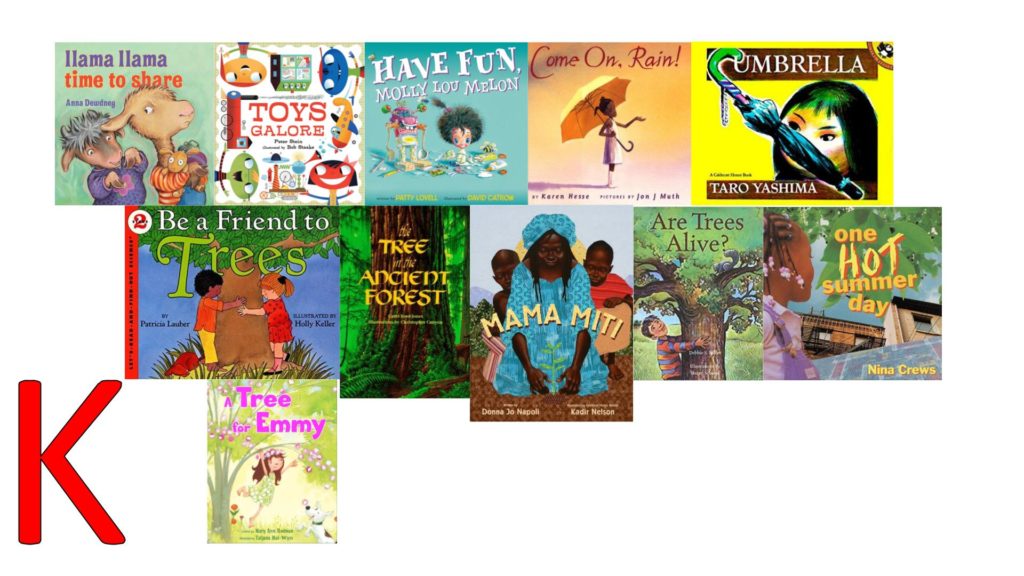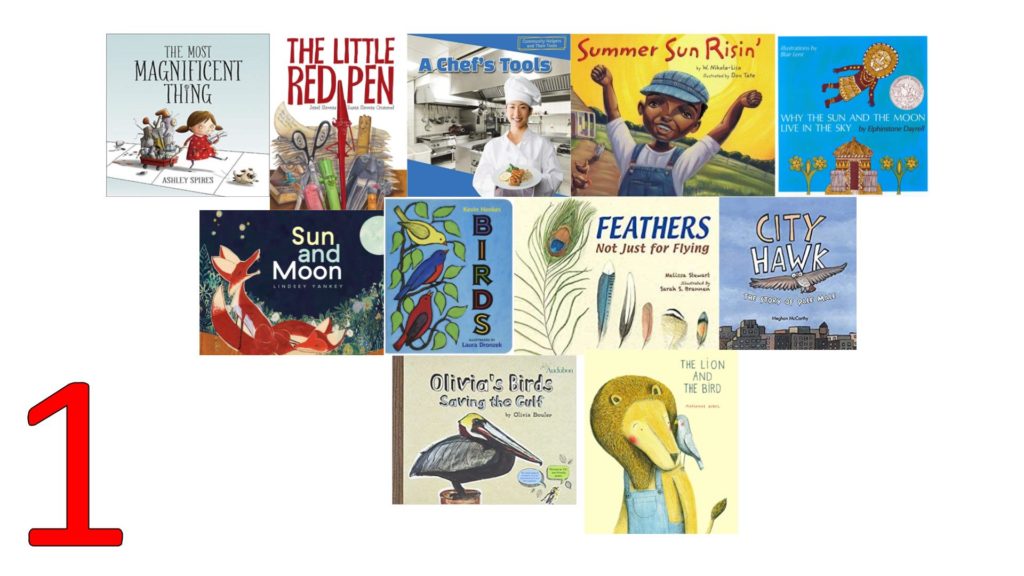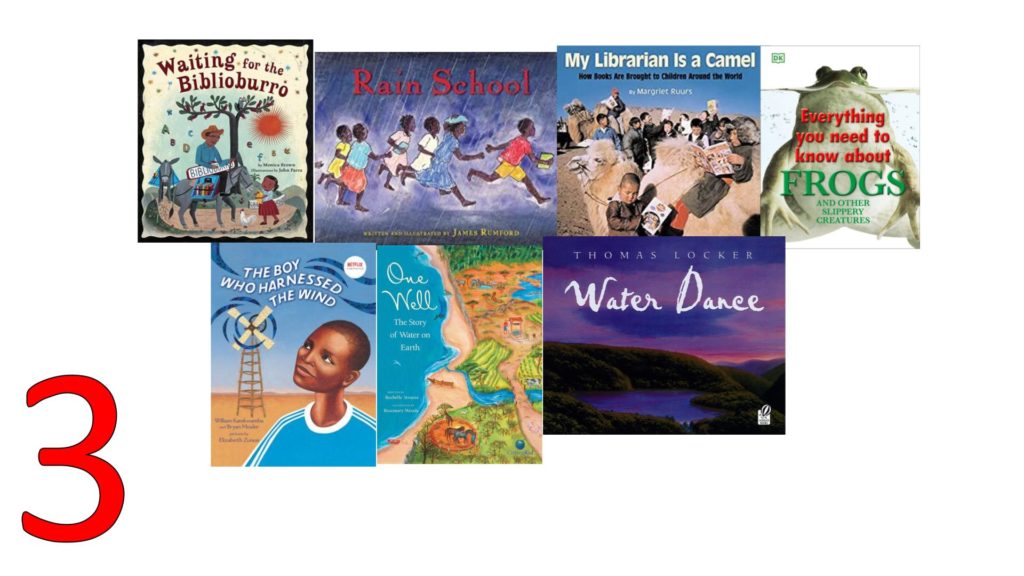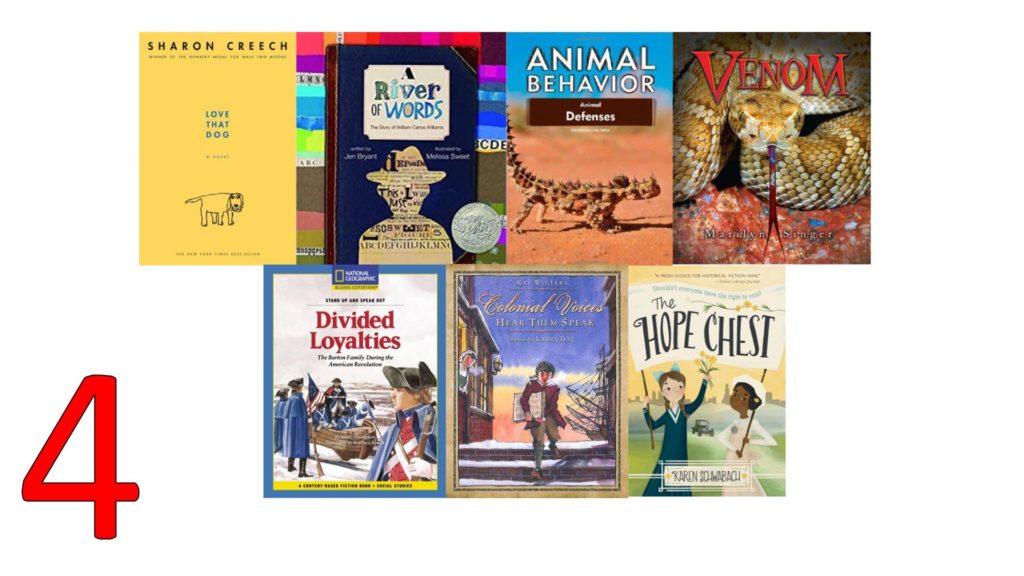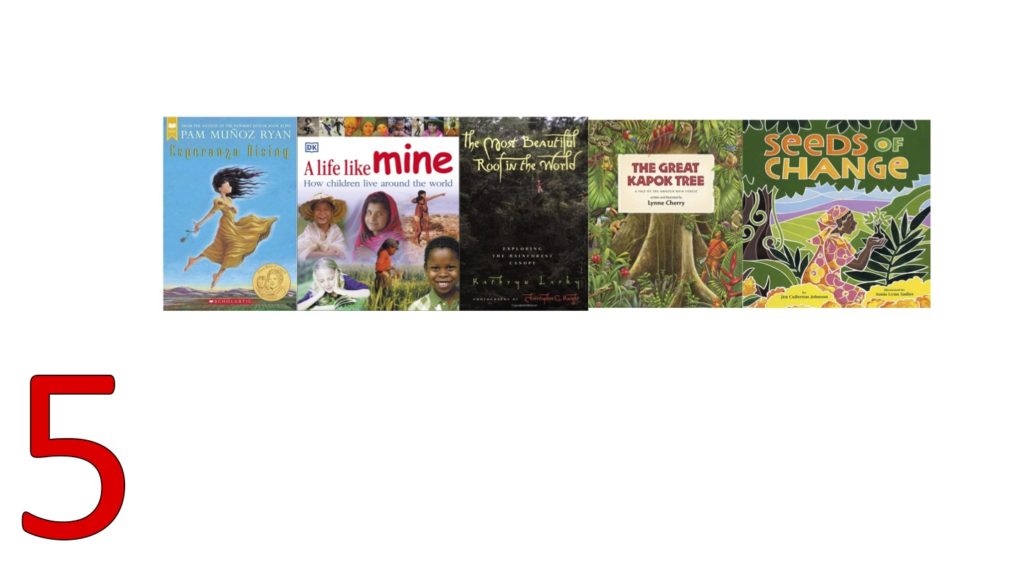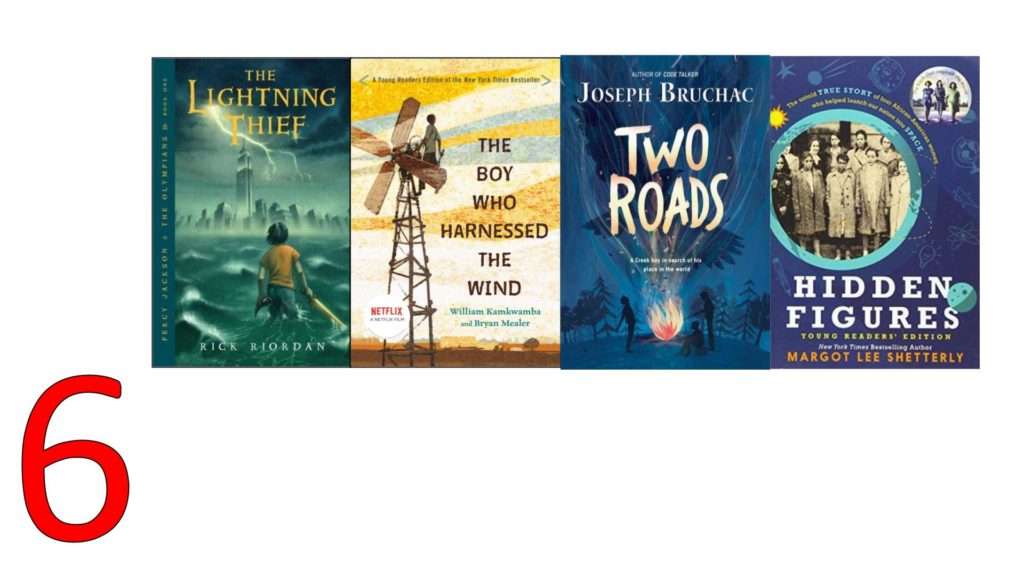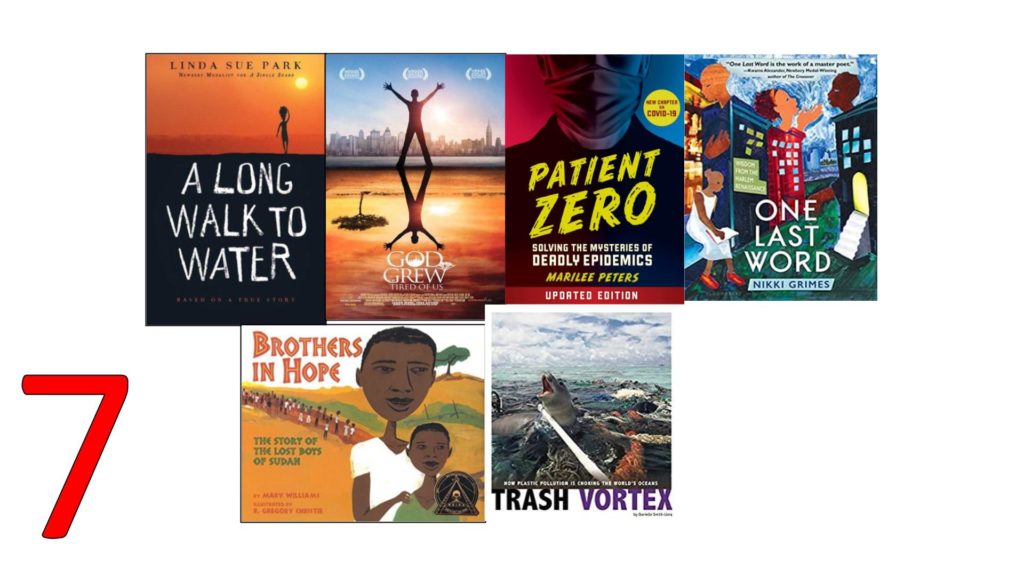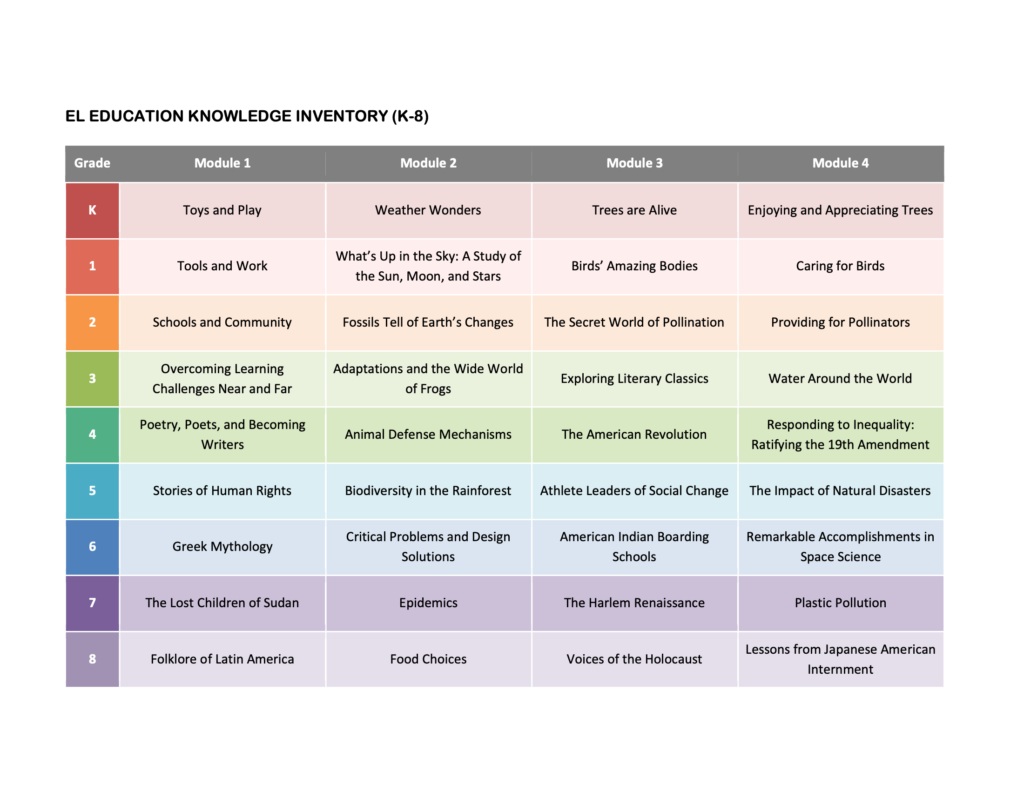EL Education (K-8)
Throughout the EL Education K–8 Language Arts curriculum, content knowledge and reading acumen are sharpened by engagement with rich, authentic, and complex texts that affirm students’ identities as learners and connect their academic learning to the outside world. Lessons help build students’ executive functioning and social skills while also calling on them to make meaningful contributions to their communities. The phonics program is differentiated and rooted in cognitive science: the protocols provide extra reinforcement or quicker pacing as students need. Many specific features are built in to support English learners.
Rich, rigorous, diverse texts:
How EL Education designs for:
Deep knowledge building
The eight-week modular structure allows students to go deep with each topic and read full-length core texts supported by a whole range of supplemental readings. EL Education seamlessly incorporates life skills into history, science, and literature lessons. For example, students often plan and evaluate their day’s work in terms of its content but also by their ability to stay focused, think flexibly, and prioritize tasks.
All writing and conversations are purposeful, focused, and anchored in the content students are learning. Students write about and discuss texts daily. They also are given straightforward tools to work with vocabulary and syntax encountered in their readings. Many of these are designed for universal use and are especially helpful for multilingual learners.
Foundational skills and fluency for beginning and older readers
EL Education offers a research-based foundational skills program grounded in the Science of Reading. It includes a comprehensive 60-minute skills block where students work through a systematic scope and sequence. Lessons are rich and playful—a reminder of how joyous it is to learn to read. Students practice skills through a spirited mix of games, songs, and dances. Weekly assessments allow teachers to precisely measure progress and respond with extra reinforcement or quicker pacing. Decodable readers used in the primary grades connect to the read-alouds and module topics. Written and oral routines build automatic word recognition.
Reading fluency is a focus of foundational skills instruction from first grade on. Grade-level fluency practice opportunities are baked seamlessly into the lessons. In grades 6-8, for instance, the curriculum includes suggestions for building fluency and meeting the needs of all learners, providing varied and lively ways for students to identify and engage with the material while getting the practice repetitions they need. Students are asked to reflect on their goals and progress at various points, establishing agency early on.
Unlock Phonics, a parallel, asynchronous support designed for students in grades 3-5, is a versatile program that also caters to the unique needs of intermediate students who require additional foundational grounding. Its adaptability ensures that all students, regardless of their starting point, can access essential reading skills through tailored support, interactive digital learning, and a focus on fluency.
Throughout the curriculum, teachers can find extensive guidance in the Teaching Notes section under the subheading “Support All Students.” A separate Teacher’s Guide for each module provides heavy and light support options for multi-language learners, including extra practice with foundational skills.
Equitable access to challenging texts
Students engage deeply with complex texts over carefully crafted repeat encounters. Peer-to-peer learning protocols and classroom routines provide concrete supports for accessing the readings. Frequent assessments solidify learning and provide tools for re-teaching as needed. Social learning is a mainstay, with students working together frequently. EL Education pays attention to students owning their learning and developing the habits of successful student-citizens.
Topics of study
Learning and exhibiting deep knowledge
Foundational skills instruction
Access EL Education
EL Education was developed by the nonprofit EL Education, which continues to make the curriculum openly available on its website. Both Open Up Resources and Imagine Learning have partnered with EL Education to offer print materials and trade books necessary to use the curriculum. EL Education has also partnered with Kiddom to provide the K–5 Language Arts Curriculum 2017 and 6–8 Language Arts Curriculum 2019 editions in digital and print formats.
EL Education (K-8) in districts
11/07/2023
“Our old ELA curriculum didn’t really focus on collaboration with the people in your class, which is obviously incredibly important for us.”
06/07/2023
“It’s teaching us ELA skills, but it’s also teaching us life skills, things that we need to know for the future.”
06/07/2023
“The EL curriculum is great for enhancing creativity, because there’s so many projects that with other curricula you wouldn’t have thought of doing.”
06/07/2023
“All students are getting access to complex texts.”
06/05/2023
“What excites me is seeing the fifth graders in these deep conversations.”
06/05/2023
01/24/2023
01/10/2023
“There was a commitment to reduce variability in classrooms across grade levels and schools and to really dose up our instructional leadership team.”
11/15/2022
“It helps to have that uniform language. Something I firmly believe is that the best ideas come from the forging fires of collaboration.”
11/15/2022
“I have the knowledge and skills to teach them to read, and I feel confident in what I am giving them. It makes me feel hopeful I’m affecting change.”
11/15/2022
“A core value of this building really is joy. We want kids to come and love school and be joyful, and we want teachers to be joyful.”
11/14/2022
“It is giving everybody the same information and exposure that they would not be having otherwise.”
11/14/2022
“Teachers have been really excited about the collaboration and the academic talk that the students are building.”
10/13/2022
“There were times in my career I thought, ‘This is hard. I don’t feel like this is working.’ I don’t feel that way now. Every year I get better.”
10/13/2022
“You know you have the quality, and it is proven and researched. Now the delivery is up to you.”
10/13/2022
“Students are becoming content experts….in kindergarten, they can tell you eveything you want to know about trees.”
10/12/2022
“A culture shift overall in the building feels good and feels different – we have the same language, and we speak the same language.”
10/12/2022
“When teachers really understand what they are teaching, then you don’t have to do as much reteaching. So the payoff first starts with the students.”
10/12/2022
“In the beginning I thought, ‘I don’t want to read a script. I’m a teacher. They hired me to do my job.’ But I have learned that it is so much more.”
10/12/2022
“Kids have bought into ELA. They think what we’re doing is worthy of their time.”
10/12/2022
“‘Hard’ shouldn’t necessarily have a bad connotation…it shows the depth of the curriculum and how much more is required of my students.”
10/12/2022
“He went through that second year, and it was just magic.”
10/12/2022
12/13/2021
“We’ve definitely noticed an increase in engagement and excitement in the curriculum itself.”
11/08/2021
“Different topics at every point would get really frustrating for kids.”
11/08/2021
“This curriculum…gives me some of the questioning and it gives me places to go.”
02/11/2020
“It’s that social-emotional connection that it has as well that’s layered into everything they’re doing.”
02/11/2020
“We didn’t have to spend a whole three or four days on this poem. They got it and we moved on. They understood it, they got the themes.”
02/11/2020
“I’m letting them do it on their own, and they’re showing me that they can, and there’s that sense of empowerment from them.”
02/11/2020
“You see the confidence of kids who have never been reading the same texts… now everybody’s on the same playing field.”
02/11/2020
“I think that’s what’s really helping them…using this tougher stuff they’re being pushed.”
02/11/2020
02/11/2020
11/20/2019
09/05/2019
03/30/2018
